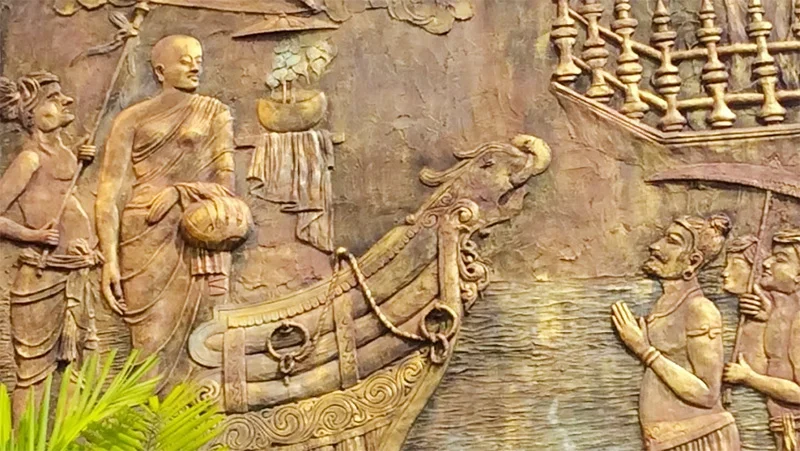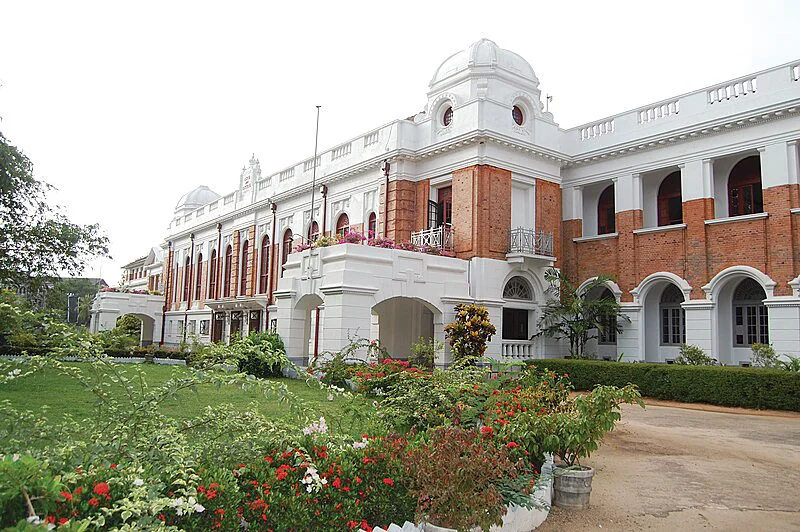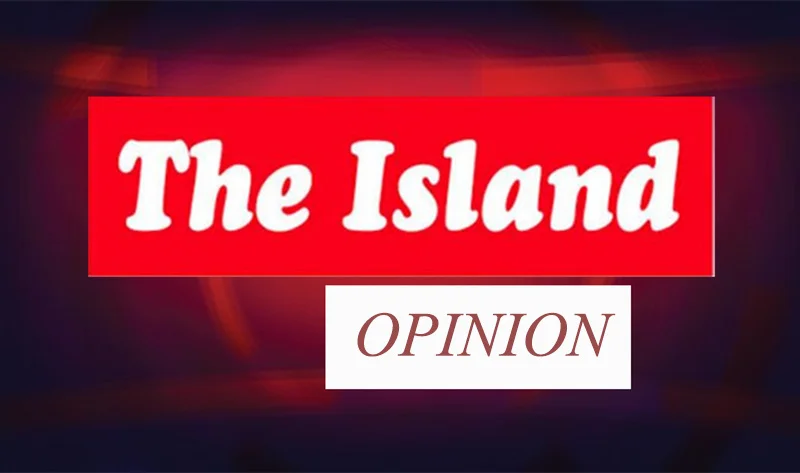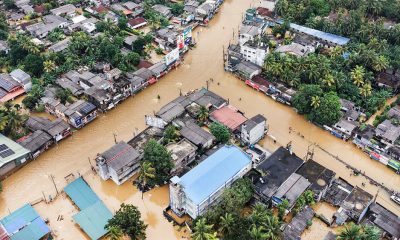Opinion
Address issues posed by Geneva togetherax

By Jehan Perera
So far, it appears that the implications of the resolution on Sri Lanka passed at the UN Human Rights Council last week against the Sri Lankan government’s objections, have been taken with a pinch of salt. Foreign Minister Dinesh Gunawardena’s reaction to the passage of the resolution by a 22-11 margin was to take note that 14 countries had abstained and, therefore, a majority of the countries had not given their support to the resolution. Two of the countries that abstained, India and Japan, are powerful and important ones to Sri Lanka, as indeed they are in the world, which makes them well suited to play a bridge-building role in the future within the UN Human Rights Council. The relative equanimity with which the passage of the resolution was received within the country as a whole would be on account of the upbeat assessment of the situation by the government. The majority of the population who voted the government into power continue to feel that it is looking after the national interest where this issue is concerned.
From the perspective of the general public, whose attention is presently gripped by other pressing matters, such as the cost of living, the passage of the UNHRC resolution posed no significant cause for alarm, especially as the government, they have voted for, has expressed confidence in having the support of a majority of countries. Further, the resolution itself carries no punitive sanctions. It provides recommendations about what the government should and should not do in terms of ensuring accountability for human rights abuses, preventing new ones from occurring, caring for war victims, increasing the space for civil society to work, and reducing the role of the military in governance. There are no punitive measures mentioned directly in the resolution. Therefore the people believe the government when it says it can deal with the evolving situation.
However, there is a difference between domestic politics and international realities. The fact that there is no immediate adverse fallout from the resolution needs to be considered carefully. There are three serious problems that can arise in the future. First, the resolution specifies that Sri Lanka will be on the agenda of the UNHRC for the next one and a half years. As this body meets three times a year, this means that Sri Lanka will be under regular scrutiny by the international community. It is liable to suffer reputational damage if critical observations against it are being constantly made which can impact negatively on the country’s attractiveness as a location for economic development projects. As the government is focused on economic development it would be in the national interest to make the Geneva process a constructive one that gives confidence to potential investors about the future of the country.
SERIOUS PROBLEMS
Second, the previous UNHRC resolutions on Sri Lanka were limited to getting the Sri Lankan government to act in accordance with the recommendations of the international community. Even when the last resolution, which was co-sponsored by the former government, had accepted a role for foreign judges, it was the Sri Lankan government that was to be in charge of the special courts. The onus was on Sri Lanka to be the party to act and to be in charge. However, the present resolution gives the power to act and to be in charge also to the office of the UN High Commissioner for Human Rights. The significance of the resolution is enhanced by the fact that it empowers the High Commissioner’s office to look also at the present and ongoing situation in the country and not limit itself to the issue of war time violations and immediate post-war violations only.
This resolution gives the High Commissioner’s office the authority to set up a special unit to gather information and evidence on human rights violations taking place in Sri Lanka. That is to “strengthen the capacity of the Office of the High Commissioner to collect, consolidate, analyse and preserve information and evidence and to develop possible strategies for future accountability processes for gross violations of human rights or serious violations of international humanitarian law in Sri Lanka, to advocate for victims and survivors, and to support relevant judicial and other proceedings, including in Member States, with competent jurisdiction” (operative Clause 6) and a budget of USD 2.8 million to implement it.
The possibility of punitive action is implicit in the fact that the recently passed resolution welcomes the report of the UN High Commissioner for Human Rights. The report of the UN High Commissioner for Human Rights, Michelle Bachelet, which was released in late January this year, set out facts from a perspective that indicates that Sri Lanka is heading in the direction of contracting space for political freedom, weakening of checks and balances in governance and increased conflict between ethnic and religious communities. The recommendations given in the UN High Commissioner’s report range from freezing of assets, travel bans and targeted sanctions against public officials suspected of human rights violations and referral of such cases to international tribunals including the International Criminal Court and an invitation to individual countries to take action under the principle of universal jurisdiction.
CONSTRUCTIVE EFFORTS
Third, if Sri Lanka is seen as not complying with the resolution, another sanction could be the loss of the European Union’s GSP Plus tariff concession currently given to Sri Lankan exporters. As the EU is Sri Lanka’s largest export market, the denial of the GSP Plus would have a negative impact on the country’s economy and on employment opportunities. When Sri Lanka lost its GSP Plus concession in 2010 due to allegations of human rights, it resulted in a loss of export revenues of an estimated Rs 150-250 billion till its reinstatement in 2017. Especially in a context in which there is an economic downturn in the aftermath of the first and second waves of the Covid pandemic, the loss of the GSP Plus needs to be strenuously resisted. One of the conditions of granting the GSP Plus concession is that human rights violations should cease and the Prevention of Terrorism Act should be replaced with a counter terrorism law that is in conformity with international standards.
None of these worst case scenarios need to come about if the government looks at the recommendations in the resolution and makes a good faith effort to implement them. In the run up to the vote on Sri Lanka in Geneva, a European ambassador said that regardless of the way the vote went, their relations with the Sri Lankan government would continue as before. This was followed by a discussion in which a balanced assessment was made of the problems of democratic politics worldwide where nationalist forces are getting increasingly powerful. In Europe, for instance, there are political parties that espouse nationalism against ethnic and religious minorities who are seen as interlopers. Those from the international community who are self-critical will have an appreciation about Sri Lanka’s own challenges of governance.
Sri Lanka’s encounter with nationalism has been central to its existence as a democratic polity. Sri Lanka has not been able to relegate nationalism to the margins as Western countries have done, and which many East European countries have still failed to do. This may explain the European ambassador’s affirmation of a continued constructive engagement with the Sri Lankan government regardless of the outcome of the UNHRC resolution on Sri Lanka. But the best answer will come if the government, together with the Opposition meets the Geneva challenge. It is encouraging that leader of the main Opposition party, Sajith Premadasa, has made this constructive offer. Similar offers by leaders of the ethnic and religious minority parties and an acceptance of the same by the government are called for. We need to reform our polity to ensure fairness in governance not so much for the sake of Geneva or future Geneva, but to be at peace with ourselves to develop our country and its people.
Opinion
Thoughts for Unduvap Poya

Unduvap Poya, which falls today, has great historical significance for Sri Lanka, as several important events occurred on that day but before looking into these, as the occasion demands, our first thought should be about impermanence. One of the cornerstones of Buddha’s teachings is impermanence and there is no better time to ponder over it than now, as the unfolding events of the unprecedented natural disaster exemplify it. Who would have imagined, even a few days ago, the scenes of total devastation we are witnessing now; vast swathes of the country under floodwaters due to torrential rain, multitudes of earth slips burying alive entire families with their hard-built properties and closing multiple trunk roads bringing the country to a virtual standstill. The best of human kindness is also amply demonstrated as many risk their own lives to help those in distress.
In the struggle of life, we are attached and accumulate many things, wanted and unwanted, including wealth overlooking the fact that all this could disappear in a flash, as happened to an unfortunate few during this calamitous time. Even the survivors, though they are happy that they survived, are left with anxiety, apprehension, and sorrow, all of which is due to attachment. We are attached to things because we fail to realise the importance of impermanence. If we do, we would be less attached and less affected. Realisation of the impermanent nature of everything is the first step towards ultimate detachment.
It was on a day like this that Arahant Bhikkhuni Sanghamitta arrived in Lanka Deepa bringing with her a sapling of the Sri Maha Bodhi tree under which Prince Siddhartha attained Enlightenment. She was sent by her father Emperor Ashoka, at the request of Arahant Mahinda who had arrived earlier and established Buddhism formally under the royal patronage of King Devanampiyatissa. With the very successful establishment of Bhikkhu Sasana, as there was a strong clamour for the establishment of Bhikkhuni Sasana as well, Arahant Mahinda requested his father to send his sister which was agreed to by Emperor Ashoka, though reluctantly as he would be losing two of his children. In fact, both served Lanka Deepa till their death, never returning to the country of their birth. Though Arahant Sanghamitta’s main mission was otherwise, her bringing a sapling of the Bo tree has left an indelible imprint in the annals of our history.
According to chronicles, King Devanampiyatissa planted the Bo sapling in Mahamevnawa Park in Anuradhapura in 288 BCE, which continues to thrive, making it the oldest living human planted tree in the world with a known planting date. It is a treasure that needs to be respected and protected at all costs. However, not so long ago it was nearly destroyed by the idiocy of worshippers who poured milk on the roots. Devotion clouding reality, they overlooked the fact that a tree needs water, not milk!
A monk developed a new practice of Bodhi Puja, which even today attracts droves of devotees and has become a ritual. This would have been the last thing the Buddha wanted! He expressed gratitude by gazing at the tree, which gave him shelter during the most crucial of times, for a week but did not want his followers to go around worshipping similar trees growing all over. Instead of following the path the Buddha laid for us, we seem keen on inventing new rituals to indulge in!
Arahant Sanghamitta achieved her prime objective by establishing the Bhikkhuni Sasana which thrived for nearly 1200 years till it fell into decline with the fall of the Anuradhapura kingdom. Unfortunately, during the Polonnaruwa period that followed the influence of Hinduism over Buddhism increased and some of the Buddhist values like equality of sexes and anti-casteism were lost. Subsequently, even the Bhikkhu Sasana went into decline. Higher ordination for Bhikkhus was re-established in 1753 CE with the visit of Upali Maha Thera from Siam which formed the basis of Siam Maha Nikaya. Upali Maha Thero is also credited with reorganising Kandy Esala Perahera to be the annual Procession of the Temple of Tooth, which was previously centred around the worship of deities, by getting a royal decree: “Henceforth Gods and men are to follow the Buddha”
In 1764 CE, Siyam Nikaya imposed a ‘Govigama and Radala’ exclusivity, disregarding a fundamental tenet of the Buddha, apparently in response to an order from the King! Fortunately, Buddhism was saved from the idiocy of Siyam Nikaya by the formation of Amarapura Nikaya in 1800 CE and Ramanna Nikaya in 1864 CE, higher ordination for both obtained from Burma. None of these Niakya’s showed any interest in the re-establishment of Bhikkhuni Sasana which was left to a band of interested and determined ladies.
My thoughts and admiration, on the day Bhikkhuni Sasana was originally established, go to these pioneers whose determination knew no bounds. They overcame enormous difficulties and obtained higher ordination from South Korea initially. Fortunately, Ven. Inamaluwe Sri Sumangala Thero, Maha Nayaka of Rangiri Dambulla Chapter of Siyam Maha Nikaya started offering higher ordination to Bhikkhunis in 1998 but state recognition became a sore point. When Venerable Welimada Dhammadinna Bhikkhuni was denied official recognition as a Bhikkhuni on her national identity card she filed action, with the support of Ven. Inamaluwe Sri Sumangala Thero. In a landmark majority judgement delivered on 16 June, the Supreme Court ruled that the fundamental rights of Ven. Dhammadinna were breached and also Bhikkhuni Sasana was re-established in Sri Lanka. As this judgement did not receive wide publicity, I wrote a piece titled “Buddhism, Bhikkhus and Bhikkhunis” (The Island, 10 July 2025) and my wish for this Unduvap Poya is what I stated therein:
“The landmark legal battle won by Bhikkhunis is a victory for common sense more than anything else. I hope it will help Bhikkhuni Sasana flourish in Sri Lanka. The number of devotees inviting Bhikkhunis to religious functions is increasing. May Bhikkhunis receive the recognition they richly deserve.” May there be a rapid return to normalcy from the current tragic situation.”
by Dr Upul Wijayawardhana
Opinion
Royal Over Eighties

The gathering was actually of ‘Over Seventies’ but those of my generation present were mostly of the late eighties.
Even of them I shall mention only those whom I know at least by name. But, first, to those few of my years and older with whom speech was possible.
First among them, in more sense than one, was Nihal Seneviratne, at ninety-one probably the oldest present. There is no truth to the story that his state of crisp well-being is attributable to the consumption of gul-bunis in his school days. It is traceable rather to a life well lived. His practice of regular walks around the house and along the lane on which he lives may have contributed to his erect posture. As also to the total absence of a walking stick, a helper, or any other form of assistance as he walked into the Janaki hotel where this gathering took place.
Referencing the published accounts of his several decades-long service in Parliament as head of its administration, it would be moot to recall that his close friend and fellow lawyer, J E D Gooneratne, teased him in the following terms: “You will be a bloody clerk all your life”. He did join service as Second Assistant to the Clerk to the House and moved up, but the Clerk became the Secretary General. Regardless of such matters of nomenclature, it could be said that Nihal Seneviratne ran the show.
Others present included Dr. Ranjith de Silva, Surgeon, who was our cricket Captain and, to the best of my knowledge, has the distinction of never engaging in private practice.
The range of Dr. K L (Lochana) Gunaratne’s interests and his accomplishments within each are indeed remarkable. I would think that somebody who’d received his initial training at the AA School of Architecture in London would continue to have architecture as the foundation of his likes /dislikes. Such would also provide a road map to other pursuits whether immediately related to that field or not. That is evident in the leadership roles he has played in the National Academy of Sciences and the Institute of Town Planners among others. As I recall he has also addressed issues related to the Panadura Vadaya.
My memories of D L Seneviratne at school were associated with tennis. As happens, D L had launched his gift for writing over three decades ago with a history of tennis in Sri Lanka (1991). That is a game with which my acquaintance is limited to sending a couple of serves past his ear (not ‘tossing the ball across’ as he asked me to) while Jothilingam, long much missed, waited for his team mates to come for practices. It is a game at which my father spent much time both at the Railway sports club and at our home-town club. (By some kind of chance, I recovered just a week ago the ‘Fred de Saram Challenge Cup’ which, on his winning the Singles for the third time, Koo de Saram came over to the Kandana Club to hand over to him for keeps. They played an exhibition match which father won). D L would know whether or not, as I have heard, in an exhibition match in Colombo, Koo defeated Frank Sedgman, who was on his triumphant return home to Oz after he had won the Wimbledon tournament in London.
I had no idea that D L has written any books till my son brought home the one on the early history of Royal under Marsh and Boake, (both long-bearded young men in their twenties).
It includes a rich assortment of photographs of great value to those who are interested in the history of the Anglican segment of Christian missionary activity here in the context of its contribution to secondary school education. Among them is one of the school as it appeared on moving to Thurstan road from Mutwal. It has been extracted from the History of Royal, 1931, done by students (among whom a relative, Palitha Weeraman, had played a significant role).
As D L shows, (in contra-distinction to the Catholic schools) the CMS had engaged in a largely secular practice. Royal remained so through our time – when one could walk into the examination room and answer questions framed to test one’s knowledge of Christianity, Buddhism, Hinduism and Islam; a knowledge derived mostly from the lectures delivered by an Old Boy at general assembly on Friday plus readings from the Dhammapada, the Bhagavad Gita, the St. John’s version of the Bible or the Koran recited by a student at senior assembly on Tuesday / Thursday.
D L’s history of Royal College had followed in 2006.
His writing is so rich in detail, so precise in formulation, that I would consider this brief note a simple prompt towards a publisher bringing out new editions at different levels of cost.
It was also a pleasure to meet Senaka Amarasinghe, as yet flaunting his Emperor profile, and among the principal organisers of this event.
The encounter with I S de Silva, distinguished attorney, who was on Galle road close to Janaki lane, where I lived then was indeed welcome. As was that with Upali Mendis, who carried out cataract surgery on my mother oh so long ago when he was head of the Eye Hospital. His older brother, L P, was probably the most gifted student in chemistry in our time.
Most serendipitous perhaps was meeting a son of one of our most popular teachers from the 1950s, – Connor Rajaratnam. His cons were a caution.
by Gamini Seneviratne
Opinion
“Regulatory Impact Assessment – Not a bureaucratic formality but essentially an advocacy tool for smarter governance”: A response

Having meticulously read and re-read the above article published in the opinion page of The Island on the 27 Nov, I hasten to make a critical review on the far-reaching proposal made by the co-authors, namely Professor Theekshana Suraweera, Chairman of the Sri Lanka Standards Institution and Dr. Prabath.C.Abeysiriwardana, Director of Ministry of Science and Technology
The aforesaid article provides a timely and compelling critique of Sri Lanka’s long-standing gaps in evidence-based policymaking and argues persuasively for the institutional adoption of Regulatory Impact Assessment (RIA). In a context where policy missteps have led to severe economic and social consequences, the article functions as an essential wake-up call—highlighting RIA not as a bureaucratic formality but as a foundational tool for smarter governance.
One of the article’s strongest contributions is its clear explanation of how regulatory processes currently function in Sri Lanka: legislation is drafted with narrow legal scrutiny focused mainly on constitutional compliance, with little or no structured assessment of economic, social, cultural, or environmental impacts. The author strengthens this argument with well-chosen examples—the sudden ban on chemical fertilizer imports and the consequences of the 1956 Official Language Act—demonstrating how untested regulation can have far-reaching negative outcomes. These cases effectively illustrate the dangers of ad hoc policymaking and underscore the need for a formal review mechanism.
The article also succeeds in demystifying RIA by outlining its core steps—problem definition, option analysis, impact assessment, stakeholder consultation, and post-implementation review. This breakdown makes it clear that RIA is not merely a Western ideal but a practical, structured, and replicable process that could greatly improve policymaking in Sri Lanka. The references to international best practices (such as the role of OIRA in the United States) lend credibility and global context, showing that RIA is not experimental but an established standard in advanced governance systems.
However, the article could have further strengthened its critique by addressing the political economy of reform: the structural incentives, institutional resistance, and political culture that have historically obstructed such tools in Sri Lanka. While the challenges of data availability, quantification, and political pressure are briefly mentioned, a deeper analysis of why evidence-based policymaking has not taken root—and how to overcome these systemic barriers—would have offered greater practical value.
Another potential enhancement would be the inclusion of local micro-level examples where smaller-scale regulations backfired due to insufficient appraisal. This would help illustrate that the problem is not limited to headline-making policy failures but affects governance at every level.
Despite these minor limitations, the article is highly effective as an advocacy piece. It makes a strong case that RIA could transform Sri Lanka’s regulatory landscape by institutionalizing foresight, transparency, and accountability. Its emphasis on aligning RIA with ongoing national initiatives—particularly the strengthening of the National Quality Infrastructure—demonstrates both pragmatism and strategic vision.
At a time, when Chairmen of statutory bodies appointed by the NPP government play a passive voice, the candid opinion expressed by the CEO of SLSI on the necessity of a Regulatory Impact Assessment is an important and insightful contribution. It highlights a critical missing link in Sri Lanka’s policy environment and provides a clear call to action. If widely circulated and taken seriously by policymakers, academics, and civil society, it could indeed become the eye-opener needed to push Sri Lanka toward more rational, responsible, and future-ready governance.
J. A. A. S. Ranasinghe,
Productivity Specialty and Management Consultant
(rathula49@gmail.com)
-
News5 days ago
Lunuwila tragedy not caused by those videoing Bell 212: SLAF
-

 News4 days ago
News4 days agoLevel III landslide early warning continue to be in force in the districts of Kandy, Kegalle, Kurunegala and Matale
-

 Latest News6 days ago
Latest News6 days agoLevel III landslide early warnings issued to the districts of Badulla, Kandy, Kegalle, Kurunegala, Matale and Nuwara-Eliya
-

 Features6 days ago
Features6 days agoDitwah: An unusual cyclone
-

 Latest News7 days ago
Latest News7 days agoUpdated Payment Instructions for Disaster Relief Contributions
-

 News2 days ago
News2 days agoCPC delegation meets JVP for talks on disaster response
-

 Business2 days ago
Business2 days agoLOLC Finance Factoring powers business growth
-

 News2 days ago
News2 days agoA 6th Year Accolade: The Eternal Opulence of My Fair Lady













